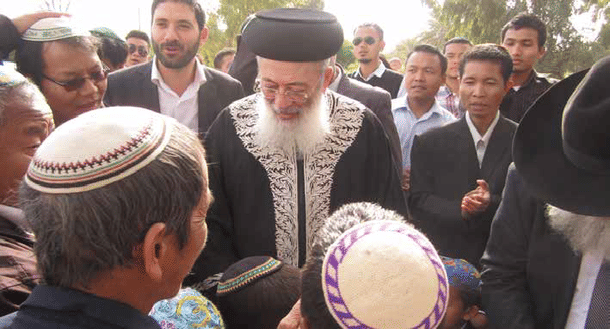Magazine
India’s Jews: The Unknown Community
Jaideep A Prabhu
Jun 05, 2017, 05:13 PM | Updated 12:35 PM IST
Save & read from anywhere!
Bookmark stories for easy access on any device or the Swarajya app.


Compared to their brothers in faith in Europe, the Middle East, and the United States, very little is known about the Jewish community in India.
Three immediate reasons come to mind for this: the first is the minuscule size of the group, which peaked at approximately 30,000 around the time of Indian independence.
A second reason for the relative nondescript status of the Jews of the subcontinent might be that they have left behind fewer records than their co-religionists around the world. This may partly be because India did not discriminate against its Jews to warrant separate laws or other instruments which may have left behind a paper trail.
The third reason could be that the Jews of India have not had any spectacular achievers as were seen in Europe—Baruch Spinoza, Moses Mendelssohn, Niels Bohr, Gustav Mahler, Sigmund Freud, and the like.
It is not clear when the first permanent Jewish settlement in India was established. There is evidence that Jewish merchants have come to the subcontinent for trade in teak, ivory, spices, peacock, ginger, and other items for at least 3,000 years. However, the first Jews to immigrate to India are thought to be the Bene Israel who were shipwrecked off the Konkan coast around 175 BCE. Others say that the first wave of Jewish immigrants was even earlier, in the eighth century BCE. This is supported by Biblical references to connections with India.
A second and third wave of Jewish immigration is better recorded—the Cochin Jews came to India fleeing persecution after the Alhambra Decree of 1492 in which Isabella I of Castille and Ferdinand II of Aragon ordered the Jews out of Spain within four months upon pain of conversion or worse.
Finally, the Baghdadi Jews came to India in the early 18th century escaping the pogroms of Dawud Pasha, most of them settling in the bustling trade centres of Bombay or Calcutta. There has always been a steady trickle of Jews into India over at least the past millennium, but the numbers were so small that the newcomers became assimilated into the majority culture unless they made their way to Jewish settlements in the subcontinent.
Besides the three major Jewish communities in India—Bene Israel, Cochin, Baghdadi—there are also the Bene Menashe of Manipur and Mizoram and the Bene Ephraim of Andhra Pradesh. The first of these latter two claims to be one of the 10 lost tribes of Israel that were exiled by the Assyrians 2,800 years ago although they seem to have settled in India only some 400-900 years ago. They were converted to Christianity by Baptist missionaries in the 19th century but reverted to Judaism in the 1970s. Although the origins of the Bene Ephraim are unclear, their story of losing and regaining their faith mirrors that of the Bene Menashe.
India is perhaps the only country in the world where Jews have not faced discrimination or persecution at the hands of the majority community. Although Indian Jews were victimised by the Portuguese when they arrived in Goa, and Tipu Sultan during his Kerala campaigns, they have always lived in harmony with the Hindu community. As scholar Nathan Katz describes the status of Jewish communities in India, they were “side-by-side but not submerged, acculturated but not assimilated.” A beautiful example Katz gives is the refusal of the Raja of Cochin, as late as 1550, to fight a battle on the Sabbath out of respect for his Jewish soldiers. Katz comments: “Probably India is the only country on earth so civilised that in war, out of deference to its esteemed Jewish soldiers, no battles were fought on the Sabbath.”
This is further underscored by evidence of the grants and privileges given to the Jewish community by Hindu kings. It is ironic then that the number of Jews in India is declining in large part due to aliyah to Israel. For Zionists, coming and living in the Jewish state was simply the right thing to do. The search for more materialist answers such as an escape from anti-Semitism or economic opportunity fails to be adequate.
As can be gleaned from scattered records in genizah collections or memoirs, the earliest of India’s Jews had become separated from mainstream Judaism and lost touch with its debates and practices. The Bene Menashe, for example, did not even have access to a Scroll of Law as the Chinese had killed their priests and burned their books and buildings. Letters indicate that the famed Jewish polymath Moshe ben Maimun had referred to Jewish communities in India who had drifted away from Judaism. When the Baghdadi Jews arrived in Bombay, they were surprised to find the Bene Israel—although clearly Jewish in their monotheistic beliefs and observation of the High Holidays, the Konkan Jews had integrated substantially into the Hindu community around them.
Indian Jews did not live in seclusion from their host communities. They were usually a vibrant part of the economic and civic life in their region. The Bene Israel, for example, despite their insulation from the Jewish world, contributed funds through Rabbi Yaakov Sapir in 1864 for the renovation of Rachel’s Tomb in Bethlehem. They had already contributed towards Bombay’s first synagogue, Shaar Harahamim, some 70 years earlier. Closer to home, it was a Bene Israel Jew, Ezra Kolet, who founded the Delhi Philharmonic Society.
David Sassoon, perhaps the most famous Baghdadi Jew and known as the Rothschild of the East, built synagogues in Byculla (Magen David), Poona (Lal Dewal), Bombay (Keneseth Eliyahoo), and three in Calcutta for the Jewish community. Additionally, the David Sassoon Benevolent Institute was established, which later became the Sassoon School. The Sassoons also supported other schools in the area, such as the Bene Israel Israelite School. In 1847, the Sassoon Mechanics’ Institute was opened, and the Sassoon Hospital was built in Poona in 1863. The beautification of Maharashtra’s two principal cities was also underwritten to a large extent by the Sassoons. The family’s docks and 11 mills provided employment to over 15,000 people by the early 20th century.
Another important Jewish figure in Indian public life was Walter Kaufmann. Kaufmann escaped to India soon after the Nazi party swept to power in Germany in 1933. It is interesting to note how India acted as a haven for Jewish refugees during the Holocaust when most Western countries, including the United States, closed their doors on them. During his brief stay of 12 years in India, the renowned music composer penned the signature tune for All India Radio (1936), founded the Bombay Chamber Music Society, and formed a string quartet that included the father of maestro Zubin Mehta, Mehli Mehta. He also wrote an opera called Anasuya, which premiered in 1939, and several books on Indian and Oriental music.
Jews played the dominant role in reviving and shaping contemporary Indian art. Dozens of now-forgotten names like Rudi Von Leyden, Emmanuel Schlesinger, Kathe Langhammer, Gladstome Solomon, Marionn Spielman, William Rothenstein, Stella Kramrisch, S Rahamin Samuel Talkar, Magda Nachman, Carmel Berkson, Rebecca Yehezekiel, Siona Benjamin, dancer Hilde Holger, photographer David Mordechai, and others mentored Indian artists, popularised them, and in introducing Western art to Indians, defined the parameters within which Indian art would conduct its debates.
India’s Jewish citizens have served their state of domicile loyally, the prime examples being Vice Admiral Benjamin A Samson, the head of India’s Western Fleet during the 1965 India-Pakistan War, and Lieutenant General J F R Jacob, who is most known for his role in the fall of Dhaka during the Third India-Pakistan War in 1971. Perhaps more in the public eye are Jews in the arts, such as actor David Reuben, actress Florence Nadira, and Bharatnatyam danseuse Leela Samson.
It is entirely possible that there is a fourth reason why Jews do not stand out in Indian life—they are in such harmonious existence with their Hindu hosts that no one notices their alterity. Jews have contributed to many aspects of Indian life—military, film, the arts, and finance. In turn, India has afforded them what any civilised state should—to live free, proud, observant, prosperous, and contributing lives. It is this foundation upon which India can build relations for the 21st century with Israel and the worldwide Jewish diaspora.
This article is a part of our special series on Israel.
Jaideep A. Prabhu is a specialist in foreign and nuclear policy; he also pokes his nose in energy and defence related matters.





